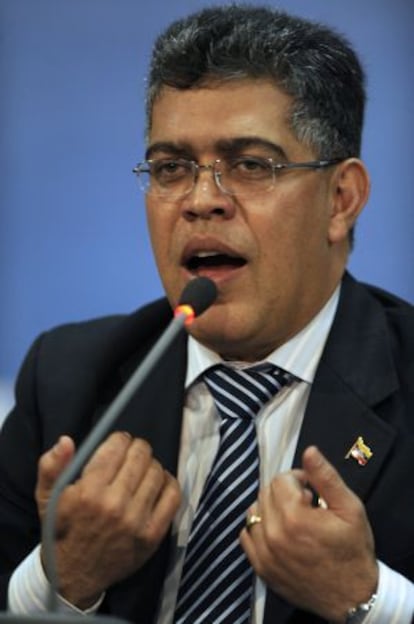Venezuela and US to exchange ambassadors this year, says foreign minister
Maduro’s controversial election victory “not brought up” by Kerry


Venezuelan Foreign Minister Elías Jaua said Thursday that he hopes his country and the United States will be able to exchange ambassadors by the end of the year as diplomatic relations between the two countries are normalized.
Jaua, who is considered the third most powerful man in the Venezuelan government, told EL PAÍS in a brief interview that the late President Hugo Chávez had pushed for the normalization of relations with Washington before he died from cancer on March 5.
“We have agreed [with the United States] on a meeting point, and also that our relationship will be one of mutual respect so that we can appoint ambassadors later this year,” the foreign minister said during a side interview at the Organization of American States (OAS) summit in Antigua, Guatemala.
Jaua met with US Secretary of State John Kerry for 40 minutes to discuss the next moves. Relations between Washington and Caracas soured in 2010 when Chávez accused the United States of spying and trying to destabilize his socialist government.
Kerry’s meeting with Jaua is “the result of a process that began in November [after being] authorized by commander Chávez to the then-foreign minister and now-president, Nicolás Maduro,” he said.
We agreed that our relationship will be one of mutual respect"
Washington has never officially recognized Maduro’s election victory, which has angered the Caracas government. President Barack Obama has only said that he had hoped that the Venezuelan authorities would agree to a recount as demanded by the defeated opposition candidate Henrique Capriles.
When asked whether an official recognition would lead to improved bilateral relations, Jaua said that “it wasn’t necessary.”
“Venezuela has a legitimate and constitutional government headed by Nicolás Maduro,” the foreign minister said. “We haven’t broken relations.”
Jaua said that issues concerning Venezuela’s political situation were not brought up during the meeting with Kerry. “There is a stable situation in Venezuela,” he said. “The government of Nicolás Maduro is working hard to overcome the challenges it faces in economy, security and fixing the electoral system.”
In another issues, Jaua explained that, beginning in September, Venezuela will abandon its participation in the Inter-American Court of Human Rights. “This is a court that has violated all procedures established under the Inter-American System of Human Rights,” he said.
Among his criticisms, Jaua said that the court involves itself in cases that do not meet with internal standards outlined in the tribunal’s proceedings. “It immediately passes judgments in many cases but remains silent when it comes to actions committed by the opposition, such as in the case of Mr Capriles,” he said.
The government has charged that Capriles and his supporters engaged in violence following the election.
Tu suscripción se está usando en otro dispositivo
¿Quieres añadir otro usuario a tu suscripción?
Si continúas leyendo en este dispositivo, no se podrá leer en el otro.
FlechaTu suscripción se está usando en otro dispositivo y solo puedes acceder a EL PAÍS desde un dispositivo a la vez.
Si quieres compartir tu cuenta, cambia tu suscripción a la modalidad Premium, así podrás añadir otro usuario. Cada uno accederá con su propia cuenta de email, lo que os permitirá personalizar vuestra experiencia en EL PAÍS.
¿Tienes una suscripción de empresa? Accede aquí para contratar más cuentas.
En el caso de no saber quién está usando tu cuenta, te recomendamos cambiar tu contraseña aquí.
Si decides continuar compartiendo tu cuenta, este mensaje se mostrará en tu dispositivo y en el de la otra persona que está usando tu cuenta de forma indefinida, afectando a tu experiencia de lectura. Puedes consultar aquí los términos y condiciones de la suscripción digital.








































